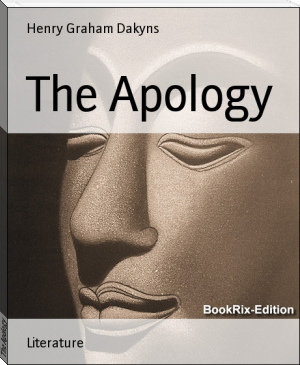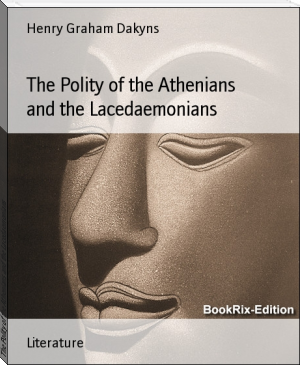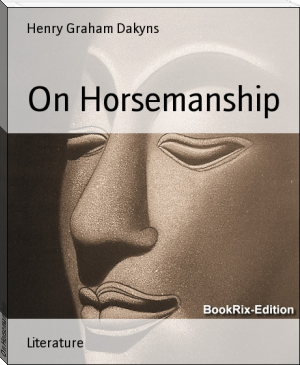The Apology - Henry Graham Dakyns (best ebook reader for pc .txt) 📗

- Author: Henry Graham Dakyns
Book online «The Apology - Henry Graham Dakyns (best ebook reader for pc .txt) 📗». Author Henry Graham Dakyns
eileto}. Cf. id. 65, 74.]
[Footnote 35: See "Hell." II. ii. 10.]
[Footnote 36: {oikteirein eautous}. See L. Dind. ad loc. For an incident in point see "Mem." II. vii.]
[Footnote 37: Plat. "Rep." iii. 404 D, "refinements of Attic confectionery."]
[Footnote 38: {ek tes psukhes}, possibly "by a healthy appetite." Cf. "Symp." iv. 41. The same sentiment "ex ore Antisthenis." See Joel, op. cit. i. 382; Schanz, Plat. "Apol." p. 88, S. 26.]
[Footnote 39: Cf. "Mem." I. ii. 49.]
[Footnote 44: {eipein auton [autos(?)]}, i.e. "according to Hermiogenes."]
[Footnote 45: Or, "must have a heavy load on their minds in the consciousness of their impiety and injustice."]
[Footnote 40: {sunagoreuein}, L. and S. cf Thuc. vi. 6, "partisans," viii. 84, "pleaded the case of" (Jowett).]
[Footnote 41: Or, "laid the greatest stress of not being guilty of impiety"; "attached the greatest importance to the fact that he was never guilty of impiety."]
[Footnote 42: {upotimasthai}. See L. Dind. cf. Cic. "Orat." i. 54; the technical word is {antitimasthai}. Cf. Plat. "Apol." 36 D; Diog. Laert. ii. 41. These authorities tell a different story. Why should these stories, if true, as no doubt they were, be omitted?]
[Footnote 43: Cf. Plat. "Crit." 44 B.]
[Footnote 46: Cf. "Mem." I. ii. 62.]
[Footnote 47: See Plat. "Rep." iii. 413 A.]
[Footnote 48: Cf. "Mem." IV. viii. 9, 10; ib. IV. ii. 3. See Plat. "Rep." v. 476 D, {exomen ti paramutheisthai auton}; and "Hunting," i. 11. The story of Palamedes is told by Ovid, "Met." xiii. 5.]
[Footnote 49: Cf. Plat. "Apol." 25 D, {poteron eme eisageis deuro os diaphtheironta tous neous kai poneroterous poiounta ekonta e akonta}.]
[Footnote 50: {omologoumenos}. For the use of the word L. Dind. cf. Diog. Laert. vii. 87, {dioper protos o Zenon en to peri anthropou phuseos telos eipe to omologoumenos te phusei zen} (Cicero's "naturae convenienter vivere," L. and S.), whereas the regular Attic use is different. Cf. "Oec." i. 11, {kai omologoumenos ge o logos emin khorei} = "consentanea ratione." "Our argument runs on all-fours." Plat. "Symp." 186 B, {to nasoun omologoumenos eteron te kai anomoion esti}, "ut inter omnes convenit."]
[Footnote 51: "Why precisely now?"]
[Footnote 52: Cf. "Mem." III. xi. 17; Plut. "Cato min." 46 (Clough, iv. 417). See Cobet, "Pros. Xen." s.n.; cf. Plat. "Symp." 173; "Phaed." 54 A, 117 D; Aelian, "V. H." i. 16; Heges. "Delph." ap. Athen. xi. 507.]
[Footnote 53: Diog. Laert. ii. 5. 35, ascribes the remark to Xanthippe, and so Val. Max. 7. 2, Ext. 1.]
[Footnote 54: See Plat. "Phaed." 89 B, where a similar action is attributed to Socrates in the case of Phaedo (his beloved disciple). "He stroked my head and pressed the hair upon my neck--he had a way of playing with my air; and then he said: 'To-morrow, Phaedo, I suppose that these fair locks of yours will be severed.'"]
[Footnote 55: Son of Anthemion. See Plat. "Men." 90 B, {airountai goun auton epi tas megistas arkhas}, Plut. "Alc." 4; id. "Coriol." 14; Aristot. "Ath. Pol." 27, 25, re {to dekazein}; 34, 23. A moderate oligarch; cf. Xen. "Hell." II. iii. 42, 44; Schol. Cod. Clarkiani ad Plat. "Apol." 18 B ap. L. Dind. ad loc.; cf. Diod. xiii. 64.]
[Footnote 56: Cf. Plat. "Apol." 23 E.]
[Footnote 57: e.g. Patroclus dying predicts the death of Hector who had slain him, "Il." xvi. 851 foll.; and Hector that of Achilles, "Il." xxii. 358 foll. Cf. Cic. "de Div." 1, 30. Plato, "Apol." 39 C, making Socrates thus address his judges: {to de de meta touto epithumo umin khresmodesai, o katapsephisamenoi mou' kai gar eimi ede entautha, en o malist' anthropoi khresmodousin, otan mellosin apothaneisthai}. "And now, O men who have condemned me, I would fain prophesy to you, for I am about to die, and that is the hour at which all men are gifted with prophetic power" (Jowett).]
[Footnote 58: Lit. "dear to the gods"; "highly favoured."]
[Footnote 59: Cf. Hom. "Od." xii. 341, {pantes men stugeroi thanatoi deiloisi brotoisin}.]
[Footnote 60: {prosantes}, i.e. "he faced death boldly as he had encountered life's blessings blandly." "As he had been no stoic to repudiate life's blessings, so he was no coward to," etc.]
Imprint
[Footnote 35: See "Hell." II. ii. 10.]
[Footnote 36: {oikteirein eautous}. See L. Dind. ad loc. For an incident in point see "Mem." II. vii.]
[Footnote 37: Plat. "Rep." iii. 404 D, "refinements of Attic confectionery."]
[Footnote 38: {ek tes psukhes}, possibly "by a healthy appetite." Cf. "Symp." iv. 41. The same sentiment "ex ore Antisthenis." See Joel, op. cit. i. 382; Schanz, Plat. "Apol." p. 88, S. 26.]
[Footnote 39: Cf. "Mem." I. ii. 49.]
[Footnote 44: {eipein auton [autos(?)]}, i.e. "according to Hermiogenes."]
[Footnote 45: Or, "must have a heavy load on their minds in the consciousness of their impiety and injustice."]
[Footnote 40: {sunagoreuein}, L. and S. cf Thuc. vi. 6, "partisans," viii. 84, "pleaded the case of" (Jowett).]
[Footnote 41: Or, "laid the greatest stress of not being guilty of impiety"; "attached the greatest importance to the fact that he was never guilty of impiety."]
[Footnote 42: {upotimasthai}. See L. Dind. cf. Cic. "Orat." i. 54; the technical word is {antitimasthai}. Cf. Plat. "Apol." 36 D; Diog. Laert. ii. 41. These authorities tell a different story. Why should these stories, if true, as no doubt they were, be omitted?]
[Footnote 43: Cf. Plat. "Crit." 44 B.]
[Footnote 46: Cf. "Mem." I. ii. 62.]
[Footnote 47: See Plat. "Rep." iii. 413 A.]
[Footnote 48: Cf. "Mem." IV. viii. 9, 10; ib. IV. ii. 3. See Plat. "Rep." v. 476 D, {exomen ti paramutheisthai auton}; and "Hunting," i. 11. The story of Palamedes is told by Ovid, "Met." xiii. 5.]
[Footnote 49: Cf. Plat. "Apol." 25 D, {poteron eme eisageis deuro os diaphtheironta tous neous kai poneroterous poiounta ekonta e akonta}.]
[Footnote 50: {omologoumenos}. For the use of the word L. Dind. cf. Diog. Laert. vii. 87, {dioper protos o Zenon en to peri anthropou phuseos telos eipe to omologoumenos te phusei zen} (Cicero's "naturae convenienter vivere," L. and S.), whereas the regular Attic use is different. Cf. "Oec." i. 11, {kai omologoumenos ge o logos emin khorei} = "consentanea ratione." "Our argument runs on all-fours." Plat. "Symp." 186 B, {to nasoun omologoumenos eteron te kai anomoion esti}, "ut inter omnes convenit."]
[Footnote 51: "Why precisely now?"]
[Footnote 52: Cf. "Mem." III. xi. 17; Plut. "Cato min." 46 (Clough, iv. 417). See Cobet, "Pros. Xen." s.n.; cf. Plat. "Symp." 173; "Phaed." 54 A, 117 D; Aelian, "V. H." i. 16; Heges. "Delph." ap. Athen. xi. 507.]
[Footnote 53: Diog. Laert. ii. 5. 35, ascribes the remark to Xanthippe, and so Val. Max. 7. 2, Ext. 1.]
[Footnote 54: See Plat. "Phaed." 89 B, where a similar action is attributed to Socrates in the case of Phaedo (his beloved disciple). "He stroked my head and pressed the hair upon my neck--he had a way of playing with my air; and then he said: 'To-morrow, Phaedo, I suppose that these fair locks of yours will be severed.'"]
[Footnote 55: Son of Anthemion. See Plat. "Men." 90 B, {airountai goun auton epi tas megistas arkhas}, Plut. "Alc." 4; id. "Coriol." 14; Aristot. "Ath. Pol." 27, 25, re {to dekazein}; 34, 23. A moderate oligarch; cf. Xen. "Hell." II. iii. 42, 44; Schol. Cod. Clarkiani ad Plat. "Apol." 18 B ap. L. Dind. ad loc.; cf. Diod. xiii. 64.]
[Footnote 56: Cf. Plat. "Apol." 23 E.]
[Footnote 57: e.g. Patroclus dying predicts the death of Hector who had slain him, "Il." xvi. 851 foll.; and Hector that of Achilles, "Il." xxii. 358 foll. Cf. Cic. "de Div." 1, 30. Plato, "Apol." 39 C, making Socrates thus address his judges: {to de de meta touto epithumo umin khresmodesai, o katapsephisamenoi mou' kai gar eimi ede entautha, en o malist' anthropoi khresmodousin, otan mellosin apothaneisthai}. "And now, O men who have condemned me, I would fain prophesy to you, for I am about to die, and that is the hour at which all men are gifted with prophetic power" (Jowett).]
[Footnote 58: Lit. "dear to the gods"; "highly favoured."]
[Footnote 59: Cf. Hom. "Od." xii. 341, {pantes men stugeroi thanatoi deiloisi brotoisin}.]
[Footnote 60: {prosantes}, i.e. "he faced death boldly as he had encountered life's blessings blandly." "As he had been no stoic to repudiate life's blessings, so he was no coward to," etc.]
Imprint
Publication Date: 12-09-2009
All Rights Reserved
Free e-book «The Apology - Henry Graham Dakyns (best ebook reader for pc .txt) 📗» - read online now
Similar e-books:





Comments (0)